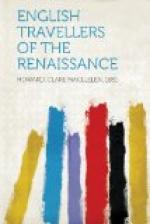At the very time when the Queen “delighted more in his personage and his dancing and valiantness than any other,"[134] Oxford betook himself to Flanders—without licence. Though his father-in-law Burghley had him brought back to the indignant Elizabeth, the next year he set forth again and made for Italy. From Siena, on January 3rd, 1574-5, he writes to ask Burghley to sell some of his land so as to disburden him of his debts, and in reply to some warning of Burghley’s that his affairs in England need attention, replies that since his troubles are so many at home, he has resolved to continue his travels.[135] Eight months afterwards, from Italy, he begs Burghley’s influence to procure him a licence to continue his travels a year longer, stating as his reason an exemplary wish to see more of Germany. (In another letter also[136] he assures Cecil that he means to acquaint himself with Sturmius—that educator of youth so highly approved of by Ascham.) “As to Italy, he is glad he has seen it, but cares not ever to see it again, unless to serve his prince or country.” The reason they have not heard from him this past summer is that his letters were sent back because of the plague in the passage. He did not know this till his late return to Venice. He has been grieved with a fever. The letter concludes with a mention that he has taken up of Baptista Nigrone 500 crowns, which he desires repaid from the sale of his lands, and a curt thanks for the news of his wife’s delivery.[137]
From Paris, after an interval of six months, he declares his pleasure at the news of his being a father, but makes no offer to return to England. Rather he intends to go back to Venice. He “may pass two or three months in seeing Constantinople and some part of Greece."[138]
However, Burghley says, “I wrote to Pariss to hym to hasten hym homewards,” and in April 1576, he landed at Dover in an exceedingly sulky mood. He refused to see his wife, and told Burghley he might take his daughter into his own house again, for he was resolved “to be rid of the cumber."[139] He accused his father-in-law of holding back money due to him, although Burghley states that Oxford had in one year L5700.[140] Considering that Robert Sidney, afterwards Earl of Leicester, had only L1OO a year for a tour abroad,[141] and that Sir Robert Dallington declares L200 to be quite enough for a gentleman studying in France or Italy—including pay for a servant—and that any more would be “superfluous and to his hurte,"[142] it will be seen that the Earl of Oxford had L5500 “to his hurte.”
Certain results of his travel were pleasing to his sovereign, however. For he was the first person to import to England “gloves, sweete bagges, a perfumed leather Jerkin, and other pleasant things."[143] The Queen was so proud of his present of a pair of perfumed gloves, trimmed with “foure Tufts or Roses of coloured Silk” that she was “pictured with those Gloves upon her hands, and for many yeeres after, it was called the Earle of Oxford’s perfume."[144] His own foreign and fashionable apparel was ridiculed by Gabriel Harvey, in the much-quoted description of an Italianate Englishman, beginning:




